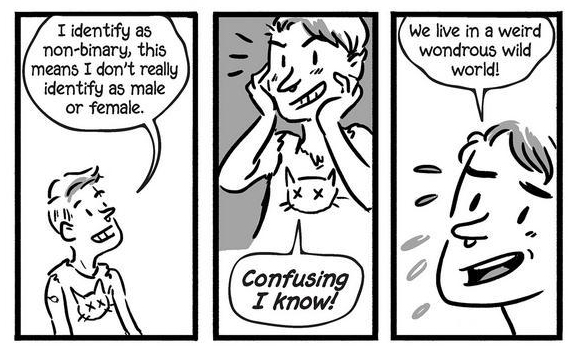Archie Bongiovanni & Tristan Jimerson On Their Graphic Novel Guide to Gender-Neutral Pronouns

Archie Bongiovanni (l) and Tristan Jimerson
Tired of explaining their use of they/them/their pronouns, Archie Bongiovanni, a genderqueer author and illustrator, with their friend Tristan Jimerson, a cisgender writer, set out to shed light on gender-neutral language. The result? A Quick & Easy Guide to They/Them Pronouns (Oni, Jun. 2018; Gr 7 Up), a hip, matter-of-fact primer that also explores the emotional impact of being misgendered.
What was your writing process like? Archie Bongiovanni: Ever since I came out as nonbinary, Tristan and I have had lots of conversations about how it’ll play out when he introduces me to new people, what to do if I get misgendered, and, more recently, how he can implement more gender-neutral language at his place of work.
Tristan Jimerson: It’s always a process. I’ve made mistakes; Archie has made mistakes. This book is a condensed and edited version of conversations that we had while trying to figure it out. While I wish our real real-life conversations were as clean and clear-cut as the ones in the book, real life is usually a lot messier.
 You offer examples of gender-neutral language (“Hey, folks” instead of “Hey, guys”). How else can we effect change? TJ: One of the surprising things to me is just how gendered my default language was. And once I became aware of it, just how difficult it was to change. It’s not something that happens overnight. It takes practice, making mistakes, and then correcting them daily.
You offer examples of gender-neutral language (“Hey, folks” instead of “Hey, guys”). How else can we effect change? TJ: One of the surprising things to me is just how gendered my default language was. And once I became aware of it, just how difficult it was to change. It’s not something that happens overnight. It takes practice, making mistakes, and then correcting them daily.
AB: Start by advocating for your nonbinary friends when they are misgendered. Take the time to explain they/them pronouns to people who don’t get it before anyone gets misgendered in person! Also, make sure to do what you can to make your workplace better for trans and gender-nonconforming folks—even if there isn’t anyone (that you know of) who identifies as such working in your space yet. This can be as simple as making sure people share their pronouns (even if they are cisgender) or making sure there are gender-neutral bathrooms available.
You skillfully use the art to make it clear why misgendering someone is emotionally draining. AB: I describe being misgendered feeling like a brick in my backpack. Throughout the day, every time I’m misgendered, it feels like another brick is added into my backpack. So by the end of the day, I can feel weighted down. Unseen, unheard, and generally invisible and frustrated. I wish folks would use gender-neutral language more often. I don’t expect strangers to know how I identify—they don’t need to—but I think if I could hear less “she/her/ma’am” in my day-to-day, that’d be a big weight off of me. We explain alternatives in the book (and in this interview!).
 What are common misconceptions you’ve encountered? TJ: That it’s grammatically incorrect. Which isn’t true. That it’s too politically correct. Which is just a way of saying that you want to be hurtful without repercussions.
What are common misconceptions you’ve encountered? TJ: That it’s grammatically incorrect. Which isn’t true. That it’s too politically correct. Which is just a way of saying that you want to be hurtful without repercussions.
That asking people to change their language to avoid hurtful phrasing is a new thing. I remember schoolyard taunts from when I was little that would never be used in public today. Language changes with time.
What advice do you have for educators who want to foster an inclusive environment? AB: Asking students what name and pronouns they’d like to be called at the beginning of the class can mean a lot for students who don’t go by their birth names. It’s also a great way to start a conversation about inclusivity with students who might be new to the topic. And this might be tougher, but advocate for nonbinary students if other teachers misgender them.
TJ: The best advice I’ve received about being a good ally is to listen. And as a cis person, practice empathy.
Mahnaz Dar is reference and professional reading editor at School Library Journal.
The job outlook in 2030: Librarians will be in demand
The job outlook in 2030: Librarians will be in demand
ALREADY A SUBSCRIBER? LOG IN
We are currently offering this content for free. Sign up now to activate your personal profile, where you can save articles for future viewing






Add Comment :-
Be the first reader to comment.
Comment Policy:
Comment should not be empty !!!